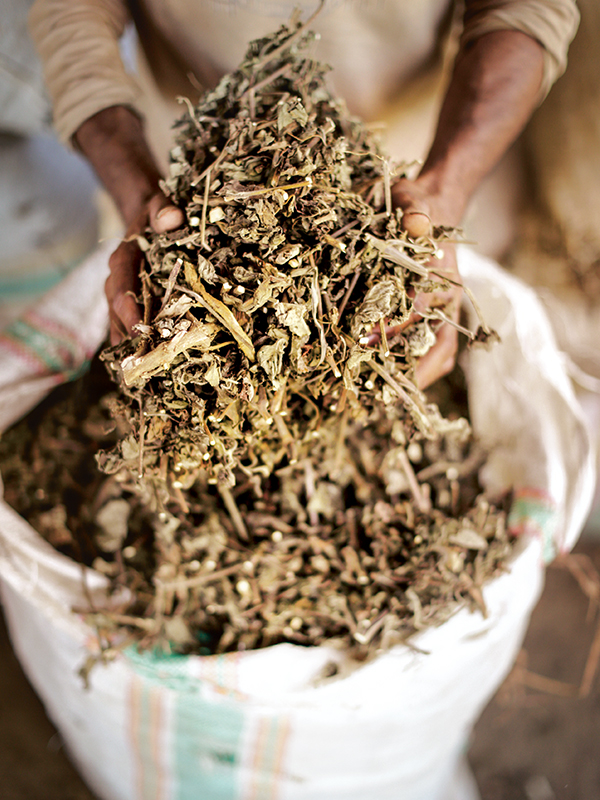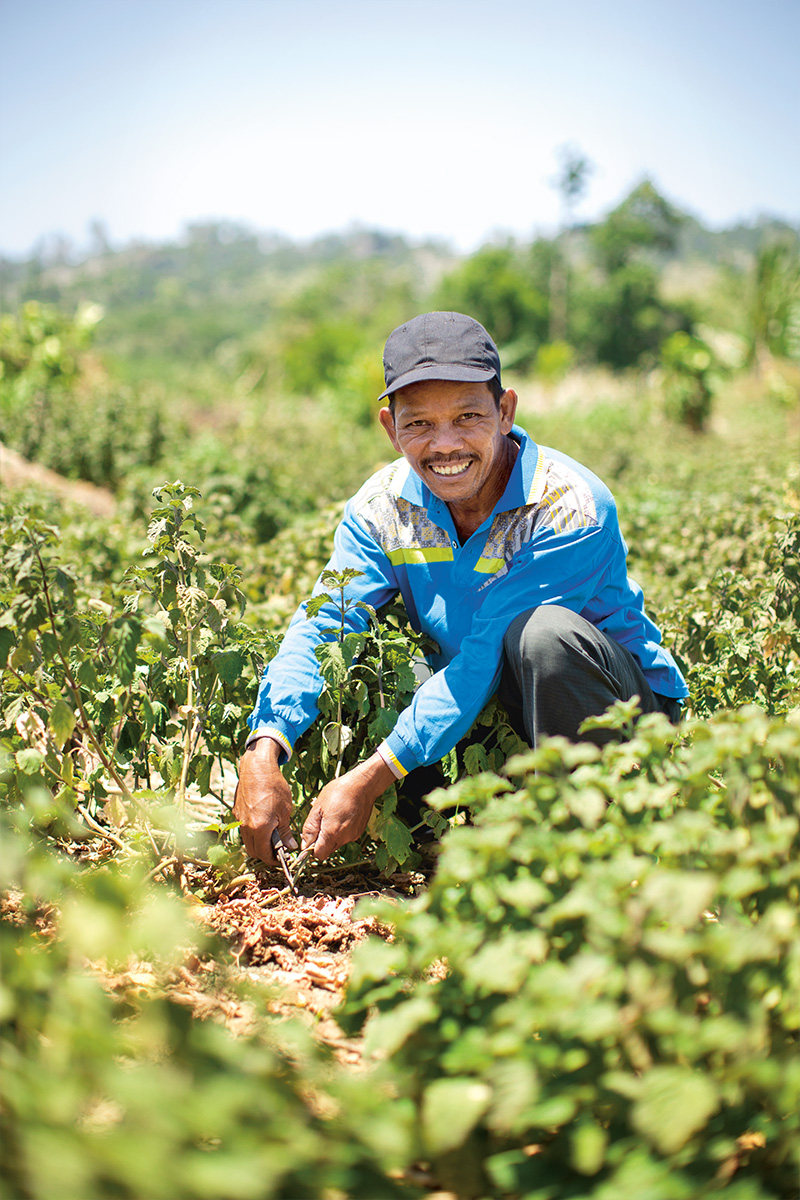
Just above the ground, Samsir cuts the patchouli plant, which he will later process into valuable raw oil in his distillation system after it has dried. The 47-year-old is one of 500,000 farmers growing the fragrant plant in Indonesia.
Using a small pair of garden shears, Samsir cuts the patchouli plant a few centimeters above the dry earth. The sun burns hot on the hilly field deep in the jungle, far from any villages in the southern Kolaka region of Indonesia. The field can only be accessed by steep, bumpy roads, making an all-terrain vehicle essential. The 47-year-old, who cultivates three hectares of patchouli, lays the snipped plants out onto dry on tarps. A short while later, he cuts the plants he cultivated a few days earlier into 10-centimeter pieces using a long knife that he fashioned out of a sharpened piece of metal taken from a car. This process is important, as more of the valuable oil remains inside the plants if they’re cut after they’ve had a chance to dry.
The farmer then carries the tightly stuffed sacks to a crude field distillation unit located on the pothole-littered road some 200 meters away. An employee has lit the fire under the large boiler and the water is already boiling. “Once it begins to steam, we fill the still with dried patchouli herbage,” says Samsir, explaining the process. Within seconds, the air is filled with the intense fragrance of the perfume oil, carried by the steam. It then has a chance to cool slowly inside a pipe, the oil separating from the water and flowing into a pail. The farmer can extract around 0.6 kilograms from 30 kilograms of dried herbage. Samsir is one of more than, probably, 500,000 farmers who cultivate patchouli alongside corn, soy, cocoa, cashews and coconuts. The plant is an important part of their livelihood. Even if many of them generate no more than 4 or 5 liters of the precious oil per week, it accounts for a large part of their income due to its high value.
Patchouli in the top 10 natural raw materials for fragrances
Patchouli is equally important to the perfume industry, finding its way into an assortment of applications. For example, Symrise uses it throughout its product range, from household detergents to shower gels, other cosmetic products and fine perfumes, in which it forms base and middle notes and ensures longevity. “The oil is one of our top 10 natural raw materials for fragrances,” explains Ramkumar Venkataraman. As Vice President of the Asia Pacific Scent & Care division, he’s responsible for purchasing raw materials, among other things. When carrying out a regular risk assessment, he and his team discovered that cultivation and thus the company’s supply of patchouli were in danger. “We realized that the plant had made a sort of migration across the islands of Indonesia over the decades, from Sumatra to Java and then more recently on to Sulawesi.”
The reason behind this phenomenon is both simple and alarming: Most farmers don’t employ good agricultural practices. They slash and burn the fields, cultivate patchouli repeatedly until the soil is depleted and then plant the next field – until there aren’t any left. Patchouli has a tendency to take the nutrients from the soil fairly quickly. The plants also become infected with diseases, resulting in the destruction of crops and impacting the livelihood of the farmers significantly.
The problems with the farming have also resulted in challenges for Symrise: “We’ve repeatedly had fluctuations in quality in recent years, for example, when it comes to the patchoulol content and acid value of the oil,” says Dr. Norbert Braun, Vice President of Innovation and QC for Scent & Care in Asia Pacific. “In addition, significant fluctuation in essential oil prices has created a huge challenge for us in the industry,” Ramkumar adds.
Three years ago, Symrise got together with Van Aroma to reflect on the dire conditions affecting this crop and decided to work together to bring about a change on the ground, says Sandeep Tekriwal, CEO of Van Aroma. Van Aroma, founded in 2006, in partnership with Ravi Sanganeria, is the largest supplier of patchouli oil worldwide. The company holds around 60 % of the global patchouli market of 1,400 to 1,500 tons and processes it for customers such as Symrise according to their requirements. This is a complex process that involves the distillation, filtration and standardization of the essential oil.
The two companies decided to review how they could make the cultivation of patchouli sustainable. Ramkumar, Norbert and Sandeep kept in regular contact and also reached out to Balittro, a Government of Indonesia research institute. They also engaged with a few leading farmers in the remote villages of Sulawesi, with the aim of finding sustainable cultivation methods. For Symrise and Van Aroma, the program represents a long-term commitment. “We first had to build a foundation of trust to ensure the farmers would work with us,” says Sandeep. The two companies signed the project agreement in late 2016. “We both wanted a change that would secure cultivation on a permanent basis – for the farmers and for us,” says Ramkumar. Sandeep adds, “It needs to be worthwhile for all parties: for the environment, the farmers and us. The project can only be successful if we all benefit.”
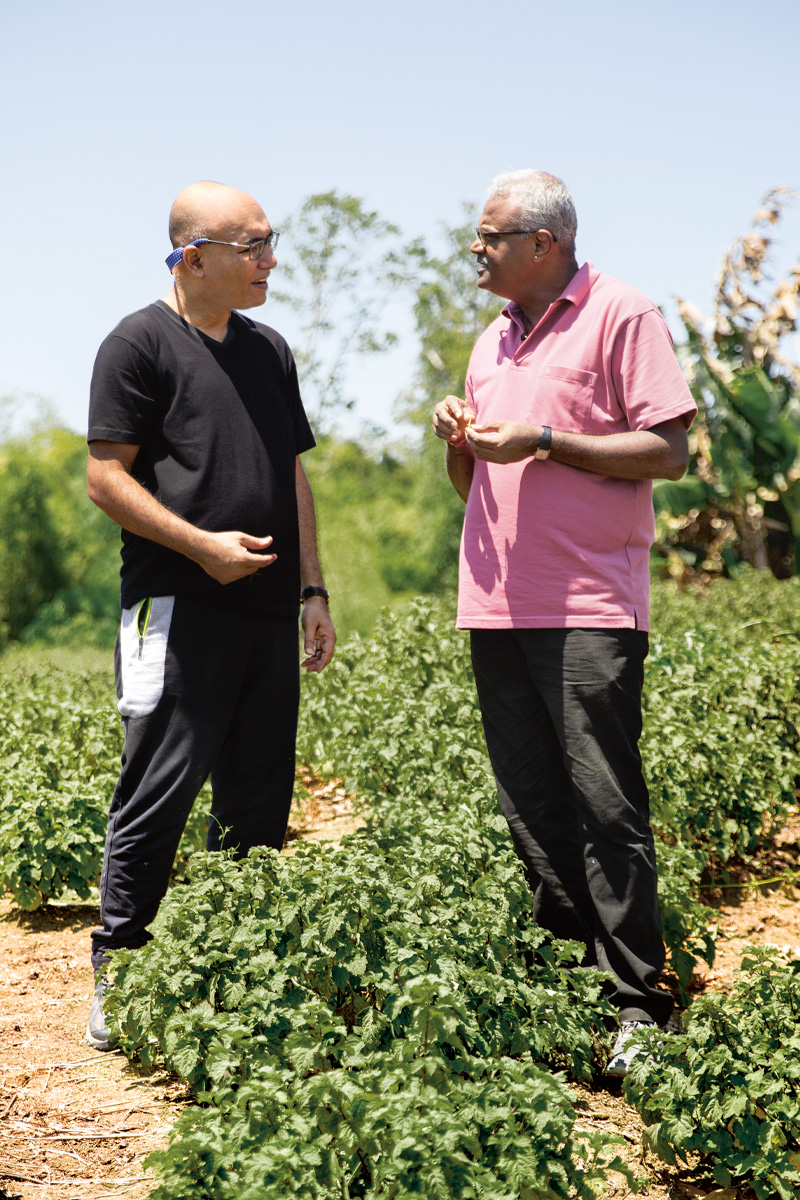
“We analyzed the method of cultivation and conditions, and we developed innovations in many areas that will highly benefit both the farmers and the environment.”
Rajnish Awasthi, Agricultural Expert
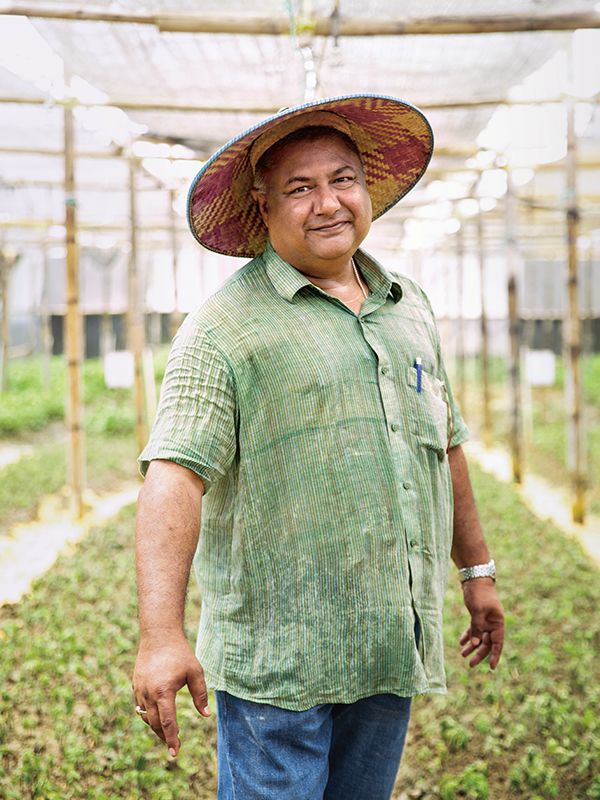
Rajnish Awasthi offers small workshops in which he explains how the farmers can produce the natural organic pesticide themselves.
Promoting sustainable farming
Rajnish Awasthi plays an important role in the project. The agricultural expert from India knows every plant and fruit growing on the many trees and shrubs along the path through the village. What he doesn’t know he finds out by asking the locals. His knowledge and interest are ideal for his work as an agronomist. Awasthi’s task was clear: He needed to figure out why after a few years it was no longer possible to cultivate patchouli in the same place and how the farmers could cultivate the crop sustainably and cost-effectively, while generating the best quality possible.
Working with his team of eight, the specialist quite literally carried out field research in the area surrounding Toari village for a year and a half. “We analyzed the method of cultivation and conditions, and we developed innovations in many areas that will highly benefit both the farmers and the environment.” It all began by experimenting with different varieties of patchouli. The aim was to find a variety that could survive in certain conditions such as extreme dryness and is resistant to as many diseases as possible. He now grows suitable seedlings in very simple but functional greenhouses and then gives them to the farmers by the hundreds of thousands free of charge. These greenhouses are made from bamboo stalks stuck into each other and covered with simple nets and tarps. “We always use as many materials as possible from the local environment in order to provide village communities with affordable variations so they can cultivate on their own in the future,” explains Awasthi.
One of the key points for ensuring sustainable cultivation is protecting the most important resource: the soil. “Patchouli depletes the soil,” says Awasthi. He came up with a multitude of ideas for addressing this problem and presented them on a demonstration field that the farmers had given up on. “The fields have very low pH values and lack zinc, manganese and boron. They also have too few microorganisms and too many negative bacteria and fungal diseases. In other words, the soil was no longer suitable for planting patchouli.”
Awasthi made suggestions that fundamentally changed cultivation. For example, he taught farmers how to create compost from the rest of the patchouli harvest and other plant waste using organic decomposers. “That way, we have good organic fertilizer every three months, which allows us to restore important nutrients in the soil,” explains Awasthi. The farmers are also supposed to dig up the patchouli roots as part of soil tilling and cultivate alternate crops at the latest after 15 months or after four harvests, allowing the soil to recover. He recommends that farmers plant other crops like citronella, vetiver, etc., that help in restoring the nutrition of the soil. The roots of vetiver, the fast-growing grass, which is also used by the perfume industry, grow deep into the soil, thus protecting it from erosion. The team has also developed a natural, organic pesticide from simple substances available locally to protect against infections. To ensure farmers are able to make it themselves following the instructions, Rajnish Awasthi offers small workshops in which he demonstrates and explains the procedure.
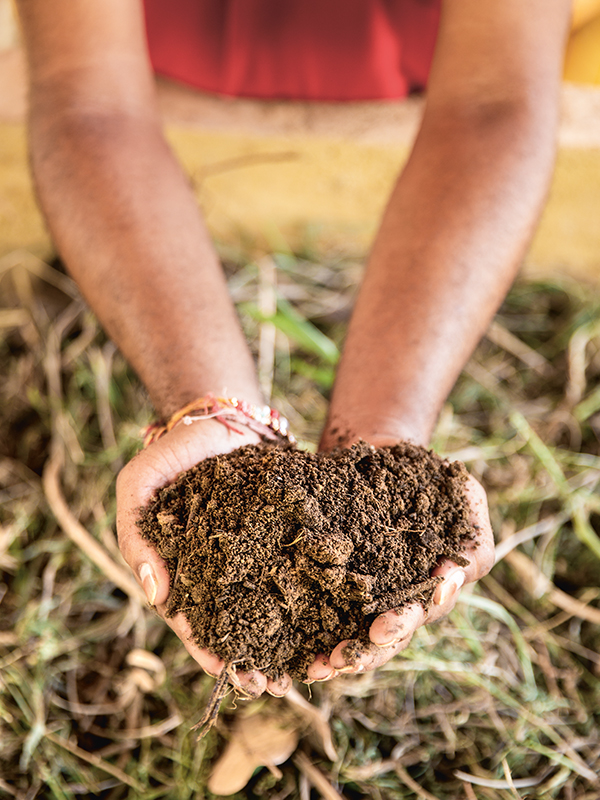
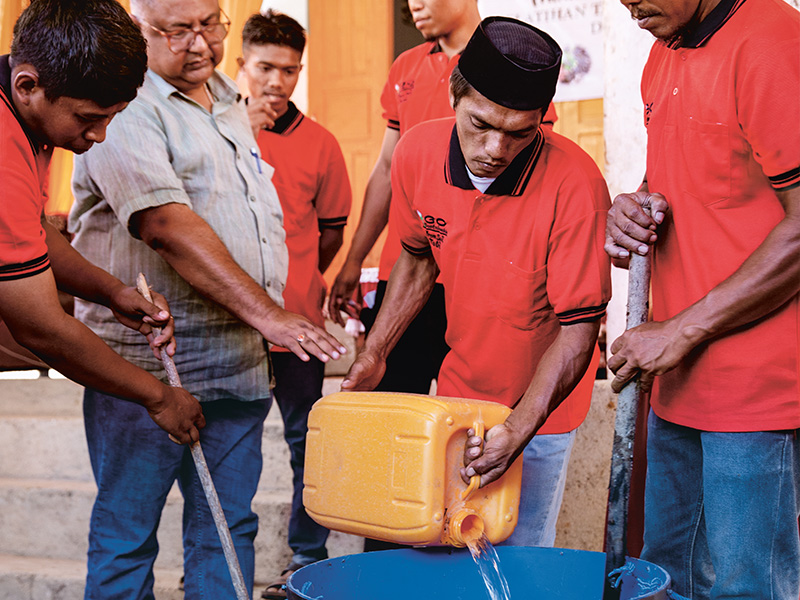
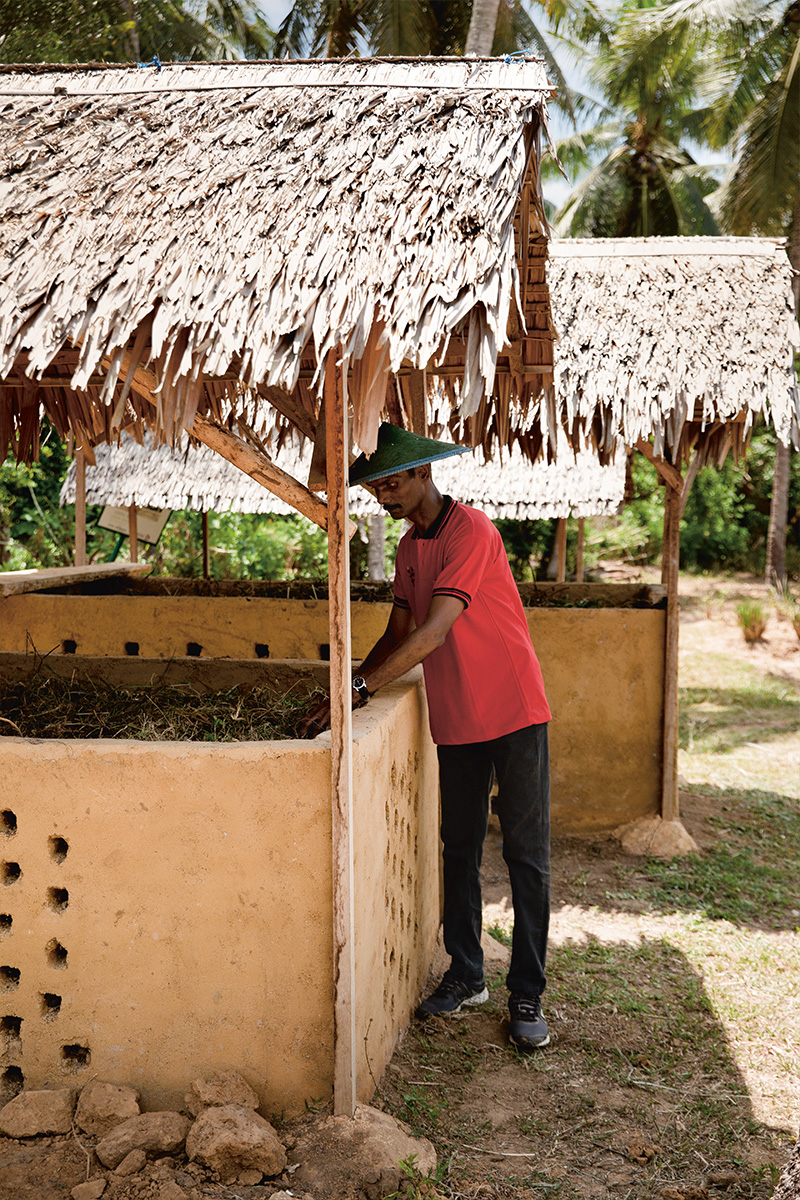
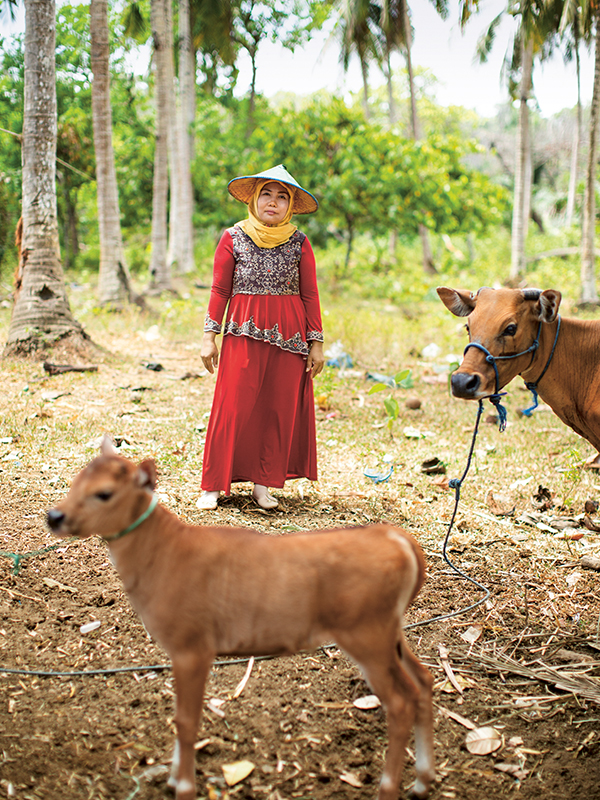
“The project has given us a great deal of hope that we’ll be able to continue cultivating patchouli in the future.”
Ibu Hasni
In close contact with farmers
Initial success can be seen not just throughout the demonstration fields, but also in villages dozens of kilometers away. Credit also goes to Ibu Hasni, an influential woman who has great connections with the farmers in Toari. She is an integral part of the project, bringing together farmers and encouraging them to adopt sustainable cultivation practices. Based in Lakito, one of the villages of Toari, everyone knows the 32-year-old mother of three. She runs a small shop in this village selling daily necessities. She also has a small restaurant set up behind a wooden wall where she offers homemade dishes. Her husband used to cultivate bananas and cocoa and distilled patchouli in his own distillation unit, until he developed a severe illness. Now the family is waiting for him to get better again.
Until then – and beyond that point – an important part of Ibu Hasni’s income relies on collecting and distilling patchouli oil. The farmers bring the dried herbage they harvest from their fields, some of which are dozens of kilometers away, to be processed at her distillery. For Ibu Hasni, as for many other people in the region, it would be very difficult to do without patchouli. “It’s good income, as the work is well paid,” she says, standing in the shade of a large banana plant and looking at a neighbor’s field of patchouli.
Ibu Hasni says the Symrise and Van Aroma joint project is therefore a godsend for her and the well-being of the villagers. Around 50 farmers are currently involved – a number that should eventually grow to some 100,000 in Sulawesi. That sounds like an unattainable number, but Ibu Hasni is driven and doesn’t consider that sum to be excessive: “There are 600 farmers in our village, at least 80 % of whom have said that they want to change their methods, too.” This trend will hopefully continue. The dedication of both companies and the farmer representatives can make a change, she says. “The project has given us a great deal of hope that we’ll be able to continue cultivating patchouli in the future.”
